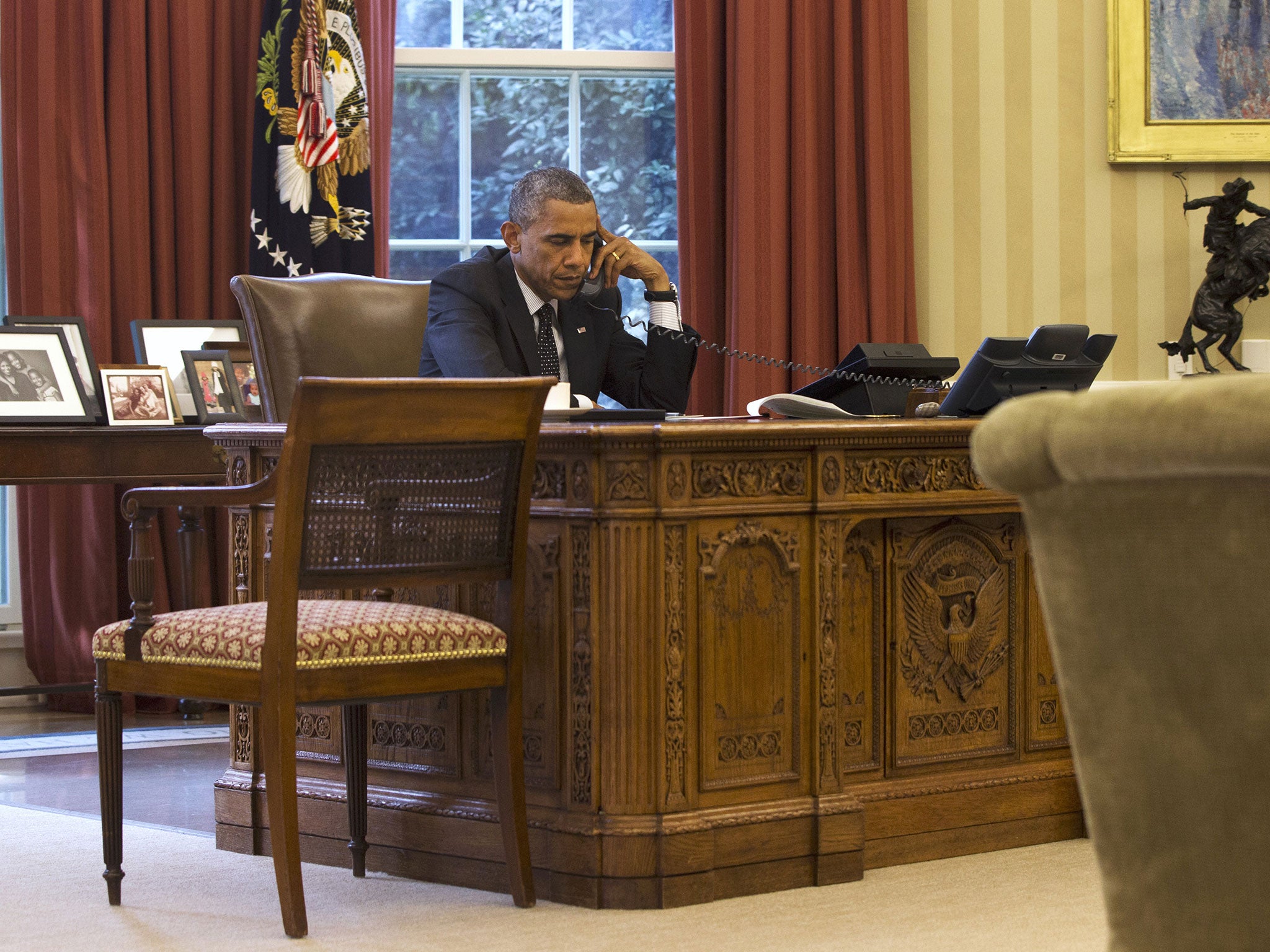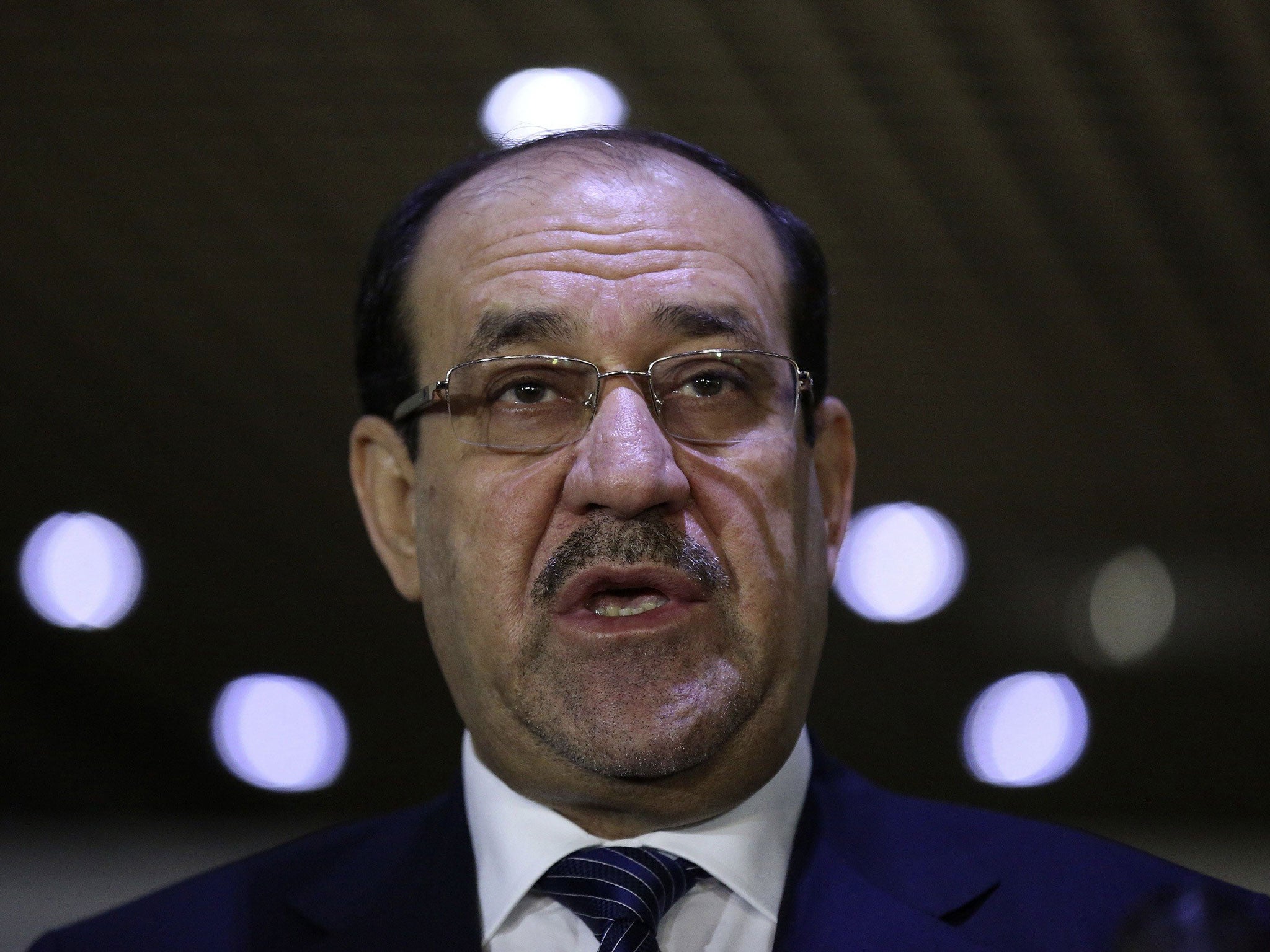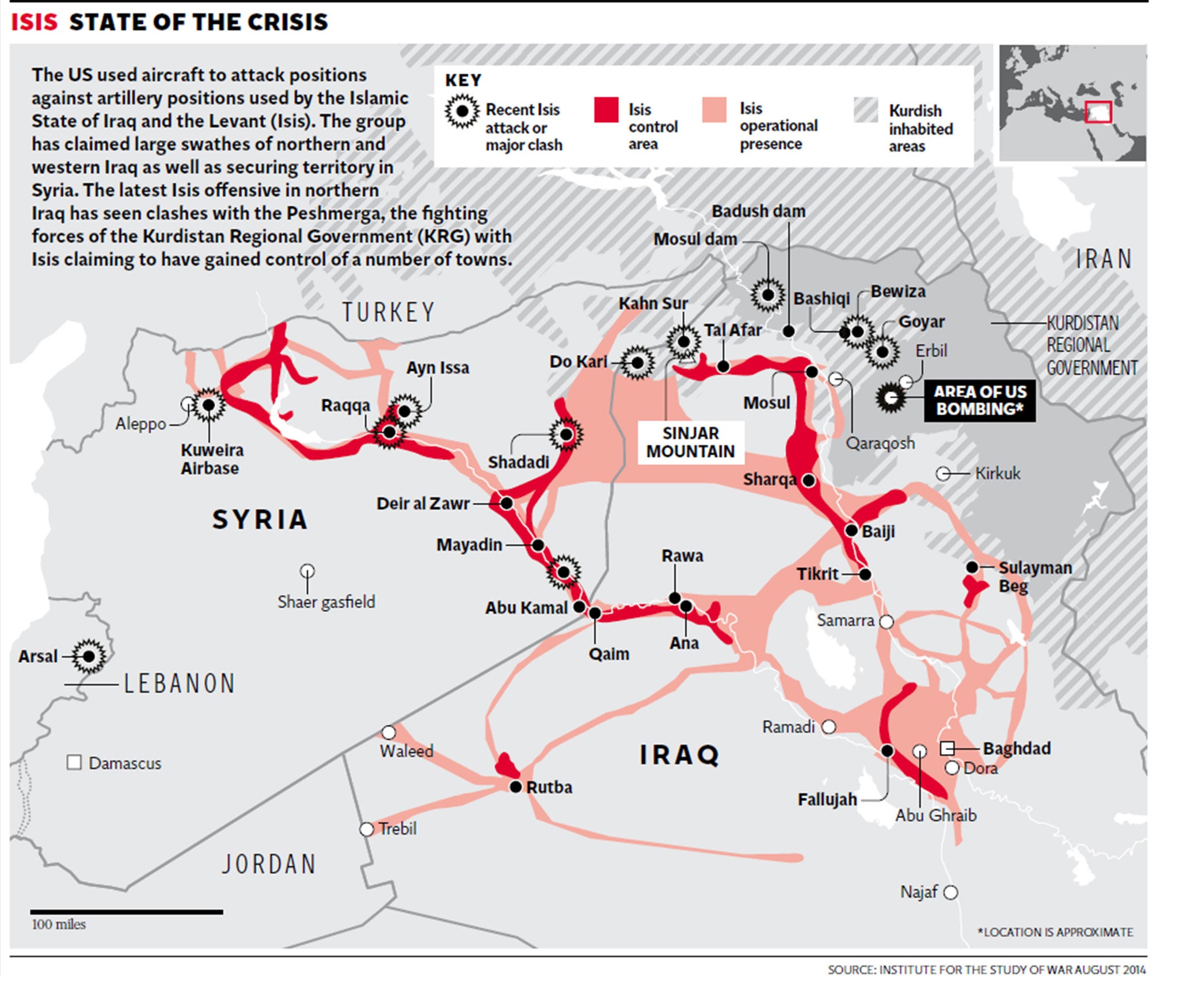Iraq crisis: Barack Obama sends in bombers to tackle Isis' 'potential genocide'
US launches air strikes against Isis militants advancing on Kurdish capital

The US has sent aircraft to bomb fighters of the Islamic State of Iraq and the Levant (Isis) in a desperate attempt to stop their advance on the Kurdish capital, Erbil.
The US intervention comes after the surprise defeat of Kurdish Peshmerga forces by Isis, which has captured a quarter of Iraq and a third of Syria in the past two months.
Britain said it would provide technical assistance to the US, but last night refused to rule out joining air strikes in future if the bloodshed worsened.
The US air strikes, the first at 1.45pm local time, were authorised by President Barack Obama to protect Christians and to avert “a potential act of genocide” against tens of thousands of Yazidis, an ancient sect denounced by Isis as “polytheists”. Many Yazidis have taken refuge on a mountain in Sinjar to escape massacre and are receiving relief supplies dropped by US aircraft.
The air strikes came as the Iraqi government said hundreds of Yazidi women had been taken captive by the Islamic militants.
Kamil Amin, spokesman for the Human Rights Ministry, said: “We think the terrorists by now consider them slaves and they have vicious plans for them. We think these women are going to be used in demeaning ways by those terrorists to satisfy their animalistic urges in a way that contradicts all the human and Islamic values.”
The Isis offensive has shown the Peshmerga, the fighting forces of the Kurdistan Regional Government (KRG), to be weaker than expected. They offered little effective resistance in Sinjar and failed to protect Christian towns in Nineveh province, of which Mosul is the capital. In a humiliating series of reverses, they retreated back to Kalak, a town on the Greater Zaab river which is the last defensible position on the road to Erbil.
In the first US attacks last night, F-18 jets dropped 500lb laser-guided bombs on mobile artillery firing in support of advancing Isis forces that were half an hour’s drive from the city. Shortly afterwards, four jets attacked a convoy and mortar position and a drone aircraft also fired at a mortar emplacement, the Pentagon said.
The US will, however, have to do more than launch limited air strikes if Isis is to be stopped. Since the self-styled “Islamic State” captured Mosul on 10 June, it has taken most of northern and western Iraq and last month scored a series of victories in eastern Syria against the Syrian army and Syrian rebel groups.
The Kurds have lost the Mosul dam on the Tigris river, enabling Isis to control the flow of water and electricity from a hydroelectric power station. Isis could blow the dam, sending a 65ft-high wall of water down the Tigris Valley, but is unlikely to do so because territory it already holds would be worst affected.

The Kurds did not expect to be targeted by Isis at this time, believing that it was fully engaged in Syria and further south against the Iraqi army.
The Peshmerga were over-extended after the KRG had expanded its territory by 40 per cent via an opportunistic land-grab following the fall of Mosul, when it took districts long disputed with the Arabs. This left the KRG with a 600-mile-long frontier to defend against Isis, with the Peshmerga, whose high military reputation is based on battles against Saddam Hussein a quarter of a century ago.
“The Peshmerga didn’t have the military equipment to face Isis,” says Professor Gareth Stansfield, an expert on Kurdish and Iraqi affairs at the Institute of Arab and Islamic Studies at Exeter University. “They basically use Kalashnikovs and rocket-propelled-grenade launchers.”
Over the past two months Isis has captured weapons including tanks, artillery, heavy machine guns and hundreds of US Humvees. Professor Stansfield says the Arab population of the disputed territories has become more anti-Kurdish since the KRG took over. Powerful Sunni tribes sympathise with Isis in a bid to drive the Kurds out, even putting the oil city of Kirkuk at risk. The professor emphasises that if Kalak falls there will be little between Isis and Erbil airport.
The long Kurdish front line is too thinly held to repel attacks. Likewise, the Iraqi army further south has failed to rally since its rout in Mosul and Tikrit two months ago. Its one counter-attack to try to retake Tikrit on 15 July was ambushed and beaten back with heavy losses.

Shia militia rushed to the front line when Isis first reached Baghdad, summoned by Grand Ayatollah Ali Sistani, the most influential Shia cleric. But many have since returned home, disillusioned by the government’s failure to provide them with training, weapons and food.
Isis may not directly assault Baghdad, but it has been increasing its hold on Sunni villages and towns to the south of the capital, an area known during the American occupation as “the Triangle of Death”.
This would enable Isis to cut roads between the capital and the Shia provinces of the south. It could probably take over Sunni enclaves such as Abu Ghraib, Amariya, Khadra and Dora in the west.
The military crisis is matched by a political crisis in Baghdad. Despite military defeat and a well-established reputation for incompetence and corruption, Nouri al-Maliki is still clinging on as Iraq’s Prime Minister.
Grand Ayatollah Sistani yesterday made his clearest call yet for Mr Maliki to go, his weekly sermon, read out by an aide, saying that politicians who cling to power “are making a grave mistake”.
Mr Maliki has been laying down conditions for his departure, such as: no prosecutions for corruption, officials he has appointed to stay in office, and personal protection. A former minister commented that it is “surreal” how Iraqi politicians have debated the future leadership of Iraq while half the country has been conquered by Isis.
Smoke rises after air strikes targeting Islamic State militants in Iraq (Getty Images)
Banned flights over Iraq
As US jets were flying over Iraq yesterday, the Federal Aviation Administration (FAA) said it was prohibiting US airlines and other commercial carriers from flying over the country.
The FAA notice to pilots said its action was prompted by the “potentially hazardous situation created by fighting between militants … and Iraqi security forces and their allies”. The ban applies to all US-registered planes, except those operated by foreign carriers, and to FAA-licensed pilots. There is an exception for flights operated with US government permission and for emergency situations.
The FAA had previously limited flights over Iraq to altitudes no lower than 30,000ft. The FAA ban comes just three weeks after a Malaysia Airlines plane with nearly 300 people on board was shot down over eastern Ukraine.
Turkish Airlines also said it had suspended flights to the Iraqi city of Erbil yesterday until further notice, for security reasons. Qantas has suspended flights over Iraq, following similar actions by Lufthansa, Emirates, Virgin Atlantic and Air France.
AP
'The Jihadis Return: Isis and the New Sunni Uprising', by Patrick Cockburn, is published by OR Books and is available at www.orbooks.com
Join our commenting forum
Join thought-provoking conversations, follow other Independent readers and see their replies
Comments
Bookmark popover
Removed from bookmarks